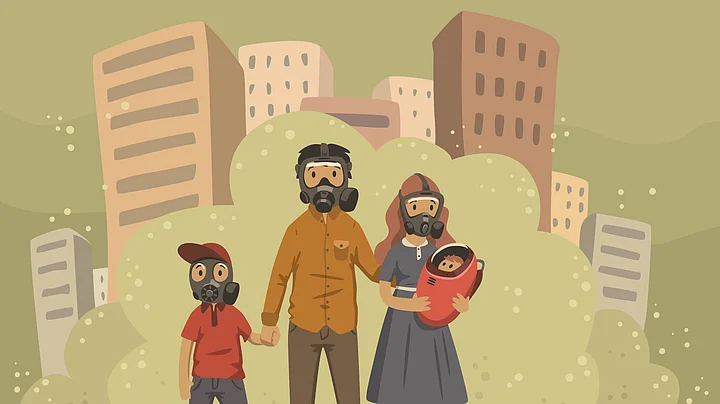Four out of five families (80 percent) living in the National Capital Region (Delhi-NCR) are suffering from ailments due to the ‘severe’ air pollution in the region, found a new survey conducted by a Delhi based citizen group, LocalCircles.
The participants mainly complained of issues of the respiratory tract, from sore throat, and runny nose to long term problems like asthma.
Sachin Taparia, the founder of LocalCircles, speaks to FIT about what the findings of the study says about the pollution crisis in the region.
But, first, here's a quick breakdown of the survey and what it found.
Who Conducted the Survey? LocalCircles, a community platform that does studies on governance and public interest, conducted an online survey in which 19,000 people (67 percent men and 37 percent women, average age of 35) from Delhi, Noida, Ghaziabad, Gurugram, and Faridabad participated.
What Did People Have to Say About Pollution? 80 percent of the participants said that at least one person in their family was struggling with health issues that could be linked to air pollution.
What Are These Health Ailments?
69 percent participants complained of sore throat, cough
56 percent participants complained of burning eyes
50 percent participants said they had a runny rose, congestion
44 percent participants said they had difficulty breathing, asthma, were facing headaches, had trouble sleeping
31 percent participants had anxiety, were unable to concentrate
7 percent of the participants said that pollution did not cause any issues for them, and 13 percent stated that they weren’t currently in Delhi-NCR.
Some participants also told LocalCircles that some of them had 'temporarily moved out to avoid the impact of high air pollution.'
The study authors underscore that when LocalCircles asked the same questions five days before Diwali, only 70 percent participants had stated that someone in their family was experiencing pollution-related ailments. The percentage increased to 80 percent after Diwali.
Have These People Consulted Doctors Then? Only few of them did. 18 percent of the participants who had stated that someone in their family was suffering from health ailments said that they had consulted a doctor.
Out of these participants, 22 percent said that they had spoken to their doctor about it, 12 percent said that they’d visited a doctor already, and another 6 percent said that they were likely to consult a doctor.
24 percent participants said that they did not feel the “need to consult a doctor” despite them facing health issues due to pollution.
What Do Doctors Suggest? Earlier this week, speaking to ANI, former AIIMS Director Dr Randeep Guleria suggested not stepping out often since pollution is breaking all previous records at the moment.
However, if it’s necessary, he adviced wearing a mask before you step out, and 'go during the day when there is sunlight.'
Why Should You Care? While PM 2.5 pollutant particles, which can penetrate into our lung passageways, are most harmful to children, older people, and those with comorbidities, the short and long-term consequences of pollution affect all. A World Health Organization (WHO) report stated that pollution “increases the risk of respiratory infections, heart disease, and lung cancer.”
Is This a Health Emergency? Likely. Air pollution lowers the immunity of your lungs, making them susceptible to pneumonia and respiratory failure, said LocalCirlces quoting doctors. COVID-19 hasn’t helped in this regard, further downgrading people’s health and immunity.
What Are Governments Doing To Help? The Delhi government had asked primary schools to conduct online classes, but revoked that order on Monday, 7 November, reopening schools from 9 November. Noida’s district collector had also ordered that online classes be held for students of classes 1-8.
While last week, the entry of trucks, diesel-powered vehicles, and vehicles with BS4 engines was banned in Delhi under the Graded Response Action Plan (GRAP), trucks were re-allowed entry after Delhi’s environment minister said that the air quality has improved.
Speaking to FIT, Sachin Taparia, the founder of LocalCircles, said, "the message for the administrators is clear – Look at what you have done to the people of Delhi.
"People have been struggling every year, and the situation has worsened after the pandemic, especially for immuno-compromised people."Sachin Taparia, Founder, LocalCircles Delhi
Taparia added that now that Delhi and Punjab are being governed by the same party, it's high time they make this a priority. Said Taparia, "The best time to act on this was March 2022. But the second-best time is now. At least make a target. Take some action, and make some progress."
(At The Quint, we question everything. Play an active role in shaping our journalism by becoming a member today.)
